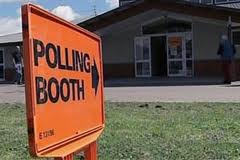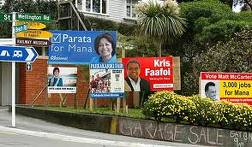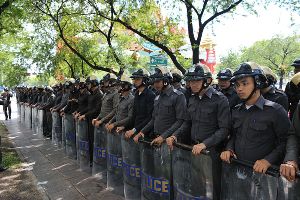From the December-January issue of The Spark.For a longer piece on the Mana Party in the election, see this article.
The Key Factor: PR and The National Party
 Novembers’ election saw a narrow victory for the National Party and its allies. Compared to their 2008 result, National saw their vote drop by about 10%- over 95,000 votes. They only received such a large share of the vote because Labours dropped even more- an enormous 255,000. ACT went from 5 MPs to 1, who would have been gone too if not for winning Epsom- the country’s richest electorate with the lowest Maori population. The Greens and NZ First were the only parties in parliament that grew their vote from 20081. 1 in 4 people did not vote. Continue reading “2011 General Election Analysis”
Novembers’ election saw a narrow victory for the National Party and its allies. Compared to their 2008 result, National saw their vote drop by about 10%- over 95,000 votes. They only received such a large share of the vote because Labours dropped even more- an enormous 255,000. ACT went from 5 MPs to 1, who would have been gone too if not for winning Epsom- the country’s richest electorate with the lowest Maori population. The Greens and NZ First were the only parties in parliament that grew their vote from 20081. 1 in 4 people did not vote. Continue reading “2011 General Election Analysis”
Mana in the election
Mana held Tai Tokerau for Hone Harawira and achieved 1% of the party vote, a respectable outcome, considering that the movement was launched just seven months ago, with bugger all money, and that the Labour and Māori Parties colluded to try and strangle it at birth. Mana won 12.7% of the Māori votes, and gained more votes than the ACT Party. The campaign that we ran was a refreshing display of left wing unity between Tino Rangatiritanga activists, Workers Party, Socialist Aotearoa, Socialist Worker, ISO and others. Mana is on the map.
But Mana was unlikely to repeat the success of the Māori Party when it was launched in 2004. For a start, there was no hikoi this time, and of course, Mana did not have the backing of the Brown Table. Mana also failed to make a real breakthrough into the Pasefika and working class Pākehā communities, perhaps because it was perceived to be a party exclusively for tangata whenua, like the Māori Party.
Continue reading “Mana in the election”
Defend MMP in the 2011 referendum
This article by Jared Phillips will appear in the June 2011 issue of The Spark
This year New Zealand electors will vote in a national referendum, held as part of the general elections, asking them firstly to indicate whether they want to change from MMP, and secondly to indicate their preferred electoral system. The other options are First Past the Post (FPP), Preferential Voting (PV), Single Transferable Vote (STV), and Supplementary Member (SM). If a majority votes in favour of retaining MMP that decision will be binding. However, if a majority votes against retaining MMP, there will be a further referendum in 2014 whereby electors will decide between MMP and whichever alternative procedure gains the most support in the 2011 referendum. If a new system is selected in 2014 it will come into effect at the 2017 election.

Real advanced democracy can only be imposed and administered by the majority of working people through a workers‘ government. In the current period though, in which the working class has clearly not yet recovered organisationally or politically from the onslaught of neo-liberalism, it is important to ensure that the electoral system offering the most democratic electoral procedure prevails. From this point of view it is in the best interests of the working people and oppressed groups to retain MMP.
Continue reading “Defend MMP in the 2011 referendum”
What the Workers Party is about
All the registered parties got the following email a few weeks ago:
Dear Parties,
I am an 18 year old female. I would really like to be interested in politics, but I don’t know anything about it! I graduated high school 1 year ago, and for a few years political representitives have making sure I am enrolled to vote for the coming election. However no party has ever come forward to us to explain how everything works. I don’t know anyone my age who has a reasonable knowledge about politics. Probably, in the 2011 general election, most of my classmates will be making uninformed desicions about their choice of vote.
I understand that I can read your views on most of your websites but none of this makes any sense to me- there needs to some kind of 101 handbook ‘for dummies’ about what you are offering.
On Facebook, there is a tab on your profile called “Political Views”. All of my friends have things like “boring”, “what?!” or “none” written as theirs. You should be concerned!
Please explain!
Here’s what Jason Froch, a Workers Party member replied to her:
Many thanks,
 I’m actually rather delighted by your e-mail, it’s good to know that I’m not alone. I too have problems trying to make sense of that parliamentary sideshow that consists of bourgeois politics.
I’m actually rather delighted by your e-mail, it’s good to know that I’m not alone. I too have problems trying to make sense of that parliamentary sideshow that consists of bourgeois politics.
In 2008 we had before us:
v An economic system which requires continued and rising levels of unemployment
v State legislation that ensures the continuing fall of real wages derived from work, already down 25% since 1982.
v A predatory war in Afghanistan where New Zealand soldiers assist in the slaughter of civilians, all to assure US military and economic interests
v The continuation of an exploitative relationship with environment which will see a number of pacific islands underwater in the near future and cause massive social costs
v Violence against women who are often unable to leave their abusers because of an inability to support themselves and their children
v The spread of third-world diseases in our communities because of inadequate housing and an inability to afford a doctor visit
v Not to mention disproportionate magnification of all the above if you happen to be born Maori, Pacific Islander, or are an immigrant
And yet this reality did not connect with those politicians whose happy smiles asked to be our representatives once again in 2008 (the only difference between them being marginal differences in the rate of tax cuts—43% of which have gone to the top 12% of taxpayers). Continue reading “What the Workers Party is about”
The Mana By-Election experiment
Note that this article does not necessarily represent the views of the whole party.
Don Franks

Below the big beaming blue and red billboards it was vacuous capitalist personality politics as usual.
Labour’s candidate claiming to be “working for Mana’ was Labour Party leader Phil Goff’s press secretary.
The best National’s Hekia Parata could produce for a slogan was a bastardisation of her own name – Vote Parata- “Heck yeah!”.
In the end Labour’s Kris Faafoi won the seat with 10,397 votes to Parata’s 9317.
National came within 1080 votes of snatching a safe Labour seat while their party is in government. Parata shattered Labour’s previous 6000-plus majority, turning Mana from the ninth safest seat in the country and one of Labour’s strongest bastions to a marginal one for the 2011 elections. Continue reading “The Mana By-Election experiment”
European election results – an overview
Mike Kay
The Spark July 2009
The March edition of The Spark carried a report of some inspiring class struggles by workers across Europe. Regrettably, that resistance has found very little political expression in the recent elections for the European Parliament. Support for far-right parties has surged, against a backdrop of the lowest ever turnout for a Euro-election, with just 43% bothering to vote.
What can we expect from National?
The Spark December 2008 – January 2009
– Philip Ferguson
With National back in power, albeit as a minority government, what can workers expect? Is this going to be a repeat of the first term of the last National government (1990-1993), the one that produced the “mother of all budgets” (cutting the dole, the DPB and other benefits by around 25%) and the notorious Employment Contracts Act?
According to much of the left, it is going to be just as bad – or even worse! They think this is especially so because of ACT, and often insist on referring to the government as the National-ACT coalition. A number of important points are missed by that analysis, however.
Obama: “Change” – to what, and who for?
The Spark December 2008 – January 2009
Since the office was first introduced in 1789, the President of the United States has been the leading figurehead in American capitalism, imperialism and exploitation. It is impressive that for the first time in 219 years, in a country that only roughly 40 years ago institutionalised segregation and only roughly 140 years ago still practised slavery, a black face is now at the top. But that does not change what the US presidency represents. Continue reading “Obama: “Change” – to what, and who for?”
For an open and honest debate
Click here to read our Second Open Letter to Socialist Aotearoa responding to their concerns about our article “Much of the left crying wolf over the Nats” and arguing that revolutionaries should be open and upfront about debating their differences.
Crisis in Thailand – a Marxist view
Thailand is currently in crisis, with a deformed expression of class struggle occurring between one side that wears yellow shirts and another that wears red. How can we make sense of this situation, and what is the way forward for those of us interested in the interests of the poor and working class? John Moore, formerly a resident in Thailand, and now a Workers Party activist, argues that the Thai working class is a mass force that has yet to roar, but that the small radical element amongst them shouldn’t ‘give up the bullet for the ballot’ to reform Thai society through the Thai capitalist state.

